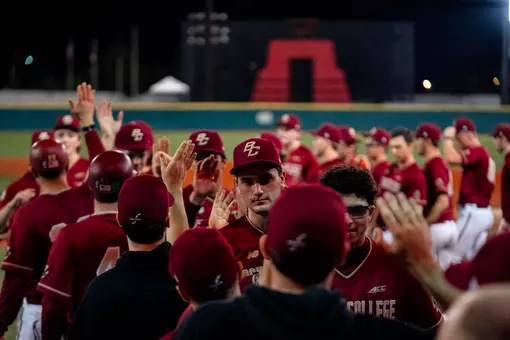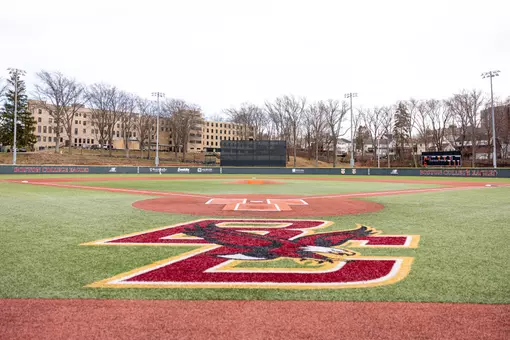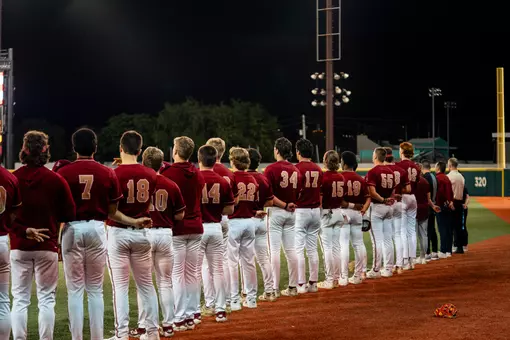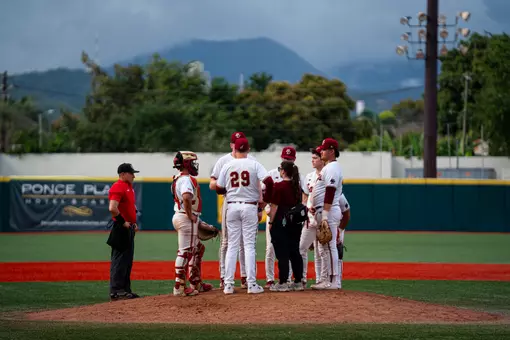Boston College Athletics
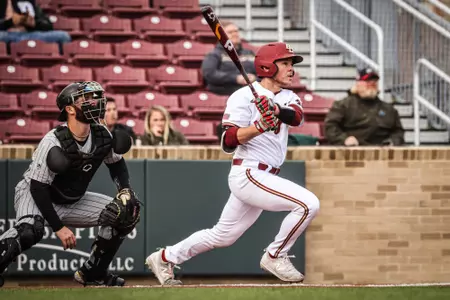
Photo by: John Quackenbos
Surf's Up For Birdball
February 15, 2023 | Baseball, #ForBoston Files
BC baseball kicks off its 2023 season with a key on-field series against Pepperdine.
Even by New England standards, the winter of 2022-2023 felt increasingly mild compared to previous years. After years defined by the sound of plows scraping pavement while snowblowers toss white fluff into yards across the region, December, January and February threw meek punches at the Greater Boston area. One weekend dipped temperatures into a record-breaking deep freeze, but the days that followed the breath-stealing blasts of wind steadily increased until conditions felt like an early-arriving spring.
The steady march towards days splashed with bright sunshine and 50 degree normals is still weeks away, but the unseasonable delight served up reminders of the oncoming rush of time spent outside in the increasing sunlight. The sights of short sleeves, the touch of what is affectionately deemed "hoodie weather," and, of course, the sound of a baseball bat cracking a ball towards an outfield fence… they all were there, standing tall against February mornings and afternoons.
Baseball season is the most natural reminder that winter ends regardless of whether it was fierce or mild, and this week, as pitchers and catchers report to big league camps in Florida and Arizona, the college season kicks off with Boston College flying west to play a three-game series against the idyllic Malibu backdrop of Pepperdine University.
"It's always really tricky," said head coach Mike Gambino. "It's tricky in the Northeast from a weather standpoint, and it's tricky from an RPI standpoint. There's always a balance of figuring out how to schedule because you want to play some really good teams, but you need to collect as many wins as possible to get yourself into the NCAA Tournament. You really need to keep an eye on the RPI and how your RPI could be affected because the goal is always to get into the NCAA Tournament."
Baseball isn't any different from any other intercollegiate sport, and America's Pastime finds itself during another unique era of shifting landscapes and geography. The sport itself is different from 20 or 30 years ago, and the powerhouse programs are aligning differently through the power conference structure more readily recognized in football and basketball.
The ACC and SEC long occupied the front end of that conversation, and each league sent nine teams apiece to last year's tournament. Half of the top-16 national seeds were from either league, and five teams from the SEC advanced to Omaha as participants in the College World Series. Two others - Texas and Oklahoma - are expected to join the SEC next year, while Notre Dame qualified for Omaha by knocking out No. 1 overall seed Tennessee in the Knoxville Super Regional.
Those same Volunteers appear on this year's schedule and are starting the 2023 season as the second-ranked team in the nation. They're a favorite to advance to Omaha alongside the rest of the SEC powerhouses at LSU, Ole Miss, Florida, Texas A&M, Vanderbilt and Arkansas, and it's likely the conference will field multiple entries in the final bracket.
"That will be a fun place to play," Gambino said. "The ACC has places with a great atmosphere, and the SEC has places with great atmospheres. We've played at some of them, playing at Auburn or playing at Ole Miss or LSU. So getting into another location as part of the ACC or SEC atmosphere is going to help our guys get used to playing [in front of those crowds]."
The SEC has sent at least one team to every College World Series since 1992, and in a sign of how different college baseball is becoming, it's been six years since Cal State Fullerton advanced out of a regional hosted by Stanford before winning a best-of-three series at Long Beach State. It's been seven years since Coastal Carolina won the College World Series championship, and two decades have passed since Rice and Fullerton won back-to-back national titles in 2003 and 2004.
That 1992 championship series that lacked the SEC was won by Pepperdine, BC's opening weekend opponent this year, and reinforced the West Coast Conference and Big West Conference as two of baseball's preeminent leagues. The WCC, like its Big West brother, was built by the California baseball culture and boasted an alumni base that included Jason Bay, Randy Winn, Dan Haren, Mark Teahan, Tom Candiotti, Kris Bryant and Von Hayes. Pepperdine itself produced 16-year veteran Randy Wolf and 1986 National League Cy Young Award winner Mike Scott, and head coach Andy Lopez won nearly 1,200 games between the Waves and power conference programs at Florida and Arizona.
That place in history doesn't change, and last year's Waves soundly swept Fullerton before dropping a one-run ballgame to Long Beach. They took one of three games from UConn and later went on a four-game winning streak that was aided by a weekend sweep of Pacific. Pepperdine later grabbed a game from nationally-ranked Gonzaga and avoided a sweep during any weekend series with the exception of three home losses to Brigham Young.
"If you look at our league, we're trying to help build the RPI," Gambino said, "because we think the ACC has 10 or 11 or 12 teams that are capable of going to Omaha. We all believe that in any given year, the fifth or sixth place team in our league can host a regional and the top two teams are national seeds. If we want to try to get three or four teams into the national seeds, then we need to [build wins] through the schedule."
Early season games are often critical for that reason, and last year, the strength of the WCC sent two teams to the NCAA Tournament after San Diego won its postseason tournament. Gonzaga had already earned its way into the tournament by sweeping Oklahoma State and Missouri, and its win over Oregon State ensured that a 30-plus win team advanced to a regional as a No. 2 seed.
As a result, these games - even as an Opening Weekend series - are pivotal for BC and the ACC. Wins can boost the Eagles' number in the Ratings Performance Index that essentially compares one team to another while simultaneously helping the entire conference in its quest to maximize the number of teams that advance and host games in the NCAA Tournament. Unlike games against local teams in New England, they put BC on a more national scale while allowing a Northeast team to escape to a more tropical, idyllic location…even in a year when the snow isn't falling with the expected regularity.
Boston College and Pepperdine will square off for three games this weekend from Eddy D. Field Stadium in Malibu, California. Friday's game is scheduled for 4:30 p.m. with Saturday and Sunday both slated for 4 p.m.
The steady march towards days splashed with bright sunshine and 50 degree normals is still weeks away, but the unseasonable delight served up reminders of the oncoming rush of time spent outside in the increasing sunlight. The sights of short sleeves, the touch of what is affectionately deemed "hoodie weather," and, of course, the sound of a baseball bat cracking a ball towards an outfield fence… they all were there, standing tall against February mornings and afternoons.
Baseball season is the most natural reminder that winter ends regardless of whether it was fierce or mild, and this week, as pitchers and catchers report to big league camps in Florida and Arizona, the college season kicks off with Boston College flying west to play a three-game series against the idyllic Malibu backdrop of Pepperdine University.
"It's always really tricky," said head coach Mike Gambino. "It's tricky in the Northeast from a weather standpoint, and it's tricky from an RPI standpoint. There's always a balance of figuring out how to schedule because you want to play some really good teams, but you need to collect as many wins as possible to get yourself into the NCAA Tournament. You really need to keep an eye on the RPI and how your RPI could be affected because the goal is always to get into the NCAA Tournament."
Baseball isn't any different from any other intercollegiate sport, and America's Pastime finds itself during another unique era of shifting landscapes and geography. The sport itself is different from 20 or 30 years ago, and the powerhouse programs are aligning differently through the power conference structure more readily recognized in football and basketball.
The ACC and SEC long occupied the front end of that conversation, and each league sent nine teams apiece to last year's tournament. Half of the top-16 national seeds were from either league, and five teams from the SEC advanced to Omaha as participants in the College World Series. Two others - Texas and Oklahoma - are expected to join the SEC next year, while Notre Dame qualified for Omaha by knocking out No. 1 overall seed Tennessee in the Knoxville Super Regional.
Those same Volunteers appear on this year's schedule and are starting the 2023 season as the second-ranked team in the nation. They're a favorite to advance to Omaha alongside the rest of the SEC powerhouses at LSU, Ole Miss, Florida, Texas A&M, Vanderbilt and Arkansas, and it's likely the conference will field multiple entries in the final bracket.
"That will be a fun place to play," Gambino said. "The ACC has places with a great atmosphere, and the SEC has places with great atmospheres. We've played at some of them, playing at Auburn or playing at Ole Miss or LSU. So getting into another location as part of the ACC or SEC atmosphere is going to help our guys get used to playing [in front of those crowds]."
The SEC has sent at least one team to every College World Series since 1992, and in a sign of how different college baseball is becoming, it's been six years since Cal State Fullerton advanced out of a regional hosted by Stanford before winning a best-of-three series at Long Beach State. It's been seven years since Coastal Carolina won the College World Series championship, and two decades have passed since Rice and Fullerton won back-to-back national titles in 2003 and 2004.
That 1992 championship series that lacked the SEC was won by Pepperdine, BC's opening weekend opponent this year, and reinforced the West Coast Conference and Big West Conference as two of baseball's preeminent leagues. The WCC, like its Big West brother, was built by the California baseball culture and boasted an alumni base that included Jason Bay, Randy Winn, Dan Haren, Mark Teahan, Tom Candiotti, Kris Bryant and Von Hayes. Pepperdine itself produced 16-year veteran Randy Wolf and 1986 National League Cy Young Award winner Mike Scott, and head coach Andy Lopez won nearly 1,200 games between the Waves and power conference programs at Florida and Arizona.
That place in history doesn't change, and last year's Waves soundly swept Fullerton before dropping a one-run ballgame to Long Beach. They took one of three games from UConn and later went on a four-game winning streak that was aided by a weekend sweep of Pacific. Pepperdine later grabbed a game from nationally-ranked Gonzaga and avoided a sweep during any weekend series with the exception of three home losses to Brigham Young.
"If you look at our league, we're trying to help build the RPI," Gambino said, "because we think the ACC has 10 or 11 or 12 teams that are capable of going to Omaha. We all believe that in any given year, the fifth or sixth place team in our league can host a regional and the top two teams are national seeds. If we want to try to get three or four teams into the national seeds, then we need to [build wins] through the schedule."
Early season games are often critical for that reason, and last year, the strength of the WCC sent two teams to the NCAA Tournament after San Diego won its postseason tournament. Gonzaga had already earned its way into the tournament by sweeping Oklahoma State and Missouri, and its win over Oregon State ensured that a 30-plus win team advanced to a regional as a No. 2 seed.
As a result, these games - even as an Opening Weekend series - are pivotal for BC and the ACC. Wins can boost the Eagles' number in the Ratings Performance Index that essentially compares one team to another while simultaneously helping the entire conference in its quest to maximize the number of teams that advance and host games in the NCAA Tournament. Unlike games against local teams in New England, they put BC on a more national scale while allowing a Northeast team to escape to a more tropical, idyllic location…even in a year when the snow isn't falling with the expected regularity.
Boston College and Pepperdine will square off for three games this weekend from Eddy D. Field Stadium in Malibu, California. Friday's game is scheduled for 4:30 p.m. with Saturday and Sunday both slated for 4 p.m.
Men's Hockey: UConn Press Conference (Feb. 20, 2026)
Saturday, February 21
Women's Basketball: SMU Postgame Press Conference (Feb. 19, 2026)
Friday, February 20
Men's Basketball: Florida State Postgame Press Conference (Feb. 17, 2026)
Thursday, February 19
The Podcast For Boston Baseball Edition
Wednesday, February 18

